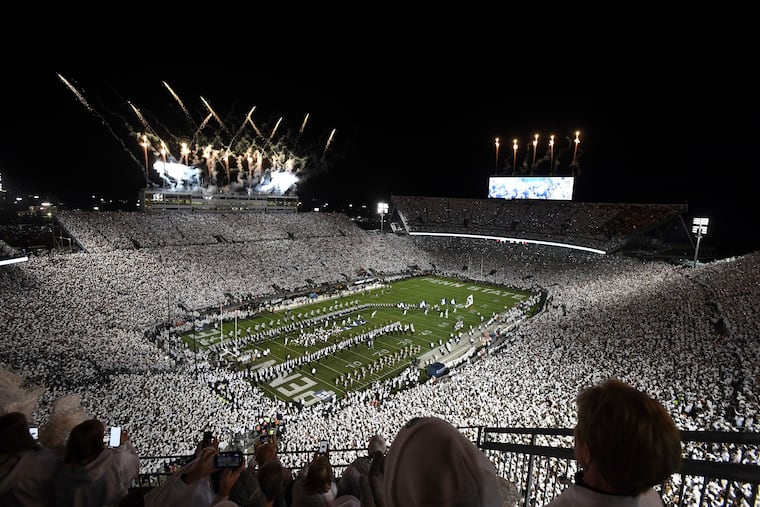Penn State board committee approves first phase of planned $700 million renovation for Beaver Stadium
The work on the first phase of the Penn State football stadium's renovation is expected to be completed in August 2027.

A committee of the Pennsylvania State University board of trustees approved the first phase of a planned four-year, $700 million renovation to its iconic 63-year-old football stadium.
The university would spend $70 million in the first phase of the Beaver Stadium renovation, which includes maintenance projects — the stadium needs about $200 million in deferred maintenance — winterization, design costs, consultant expenses, and purchase of permits.
Over the next four years, the entire west side of the stadium would be renovated and there would be restroom upgrades, additional seating options, and more concessions throughout the stadium. Also planned are larger concourses and infrastructure and safety improvements.
» READ MORE: Major renovations planned for Penn State’s Beaver Stadium
The full board of trustees will vote on the first phase of the project Friday. It may bode well that the board’s finance, business, and capital planning committee gave the project unanimous approval Thursday.
“What this will do is keep Beaver Stadium healthy and alive for a long, long time,” said Pat Kraft, Penn State’s vice president for intercollegiate athletics. “Beaver Stadium is such an important part of Penn State and who we are and what it represents.”
University officials said they expect to come back to the board for funding approval of the full project within the next year.
Penn State president Neeli Bendapudi announced in February that the university would renovate Beaver Stadium as opposed to building a new facility because it is a “far more economical option.”
Kraft estimated it would have cost Penn State $1.5 billion or more to build a new stadium.
With a capacity of 106,572 people, Beaver Stadium, at the corner of Porter Road and Park Avenue in State College, is among the largest-capacity college football stadiums in the country. The renovation would keep the stadium’s capacity at over 100,000, Kraft said.
University officials emphasized that no tuition or educational budget dollars would be used for the renovation, though they are hopeful that the state may want to contribute special funding for the project, given its economic impact. As of now, the entire project, expected to be completed by August 2027, would be paid for out of the intercollegiate athletic budget, they said. That would include fundraising, concessions, naming opportunities, sponsorships, and ticket sales, including selling premium seat options, the university said.
The university expects to raise at least $200 million through a fundraising campaign. The school also could get donations for naming rights to field level seats, concourses, and entrances, Kraft said.
Could the entire stadium be named for a donor?
“It’s not on the table right now,” Kraft said.
The first phase will be funded through a bond sale, but then the debt will be repaid with athletic funds, the university said.
The university expects to have design plans within the next 12 months, he said. Construction is expected to start in January 2025 after conclusion of the football season. Among the objectives will be to improve the circulation of people through the stadium and relieve congestion.
The football program for decades has been a primary source of revenue for the university’s athletic program, funding Penn State’s 31 sports, with more than 800 athletes participating.
The new project would be Beaver Stadium’s first major renovation in more than two decades. In 2001, the university added 60 skyboxes in a three-level structure above the stadium’s east stands.
The renovation, the university said, also is intended to allow Penn State to expand its use beyond game days, including bringing more visitors to the university during the winter months for large concerts or other events.
It also would put the university in a better position to host recently expanded college football playoffs. The first round would be played in the middle of December, Kraft said.
And it would include improvements to the field’s lighting to meet NCAA standards.